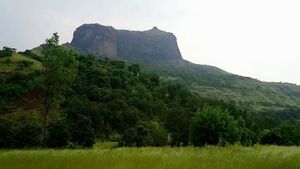Harihar Fort: A Comprehensive Guide to the Thrilling Trek
Body
Introduction to Harihar Fort
Harihar Fort, also called Harihar Killa or Harihar Gad, is an awe-inspiring hill fort located in the Nashik district of Maharashtra. Known for its steep and peculiar rock-cut steps, it has become a favorite among adventure enthusiasts, trekkers, and nature lovers. The fort's climb is challenging yet rewarding, as it gives trekkers a chance to enjoy panoramic views of the Western Ghats.
Location and Geography of Harihar Fort
Harihar Fort is situated near the Trimbak region in the Western Ghats, specifically in the Nashik district. The fort stands proudly on a triangular rock formation, which gives it a distinctive appearance. The nearby towns of Igatpuri and Trimbakeshwar make it an easily accessible destination for adventure seekers.
Historical Significance of Harihar Fort
Built during the Yadava dynasty, Harihar Fort played a significant role in protecting trade routes that connected Maharashtra to Gujarat. Like many forts in the region, it changed hands between several rulers, including the Marathas, Mughals, and the British. Its strategic importance lies in its elevation and commanding view of the surrounding region, making it a valuable military outpost in history.
The Architecture and Unique Features of the Fort
The most notable feature of Harihar Fort is its nearly vertical stairway, which is carved directly into the rock face. The steps are narrow, steep, and slippery during the monsoon, making the climb quite an adventure. Once you reach the top, you'll find remnants of the fort's old structures, including water cisterns and a small temple dedicated to Lord Hanuman. The fort is built in a triangular shape, and its topmost point offers a breathtaking view of the Sahyadri range.
How to Reach Harihar Fort
By Road
The fort is well-connected by road from major cities like Mumbai, Pune, and Nashik. The nearest village to the fort is Nirgudpada, which serves as the base for most treks. Private taxis, buses, and shared vehicles are available to reach the village from Nashik or Igatpuri.
By Train
The nearest railway stations are Igatpuri and Nashik Road, both of which are well-connected to Mumbai and other parts of Maharashtra. From the station, you can take a taxi or bus to the base village.
Nearest Airports
The closest airport to Harihar Fort is Nashik Airport, but it has limited connectivity. For better options, travelers can fly to Mumbai’s Chhatrapati Shivaji International Airport or Pune Airport and travel by road or train from there.
Best Time to Visit Harihar Fort
The ideal time to visit Harihar Fort is from October to February when the weather is pleasant and trekking conditions are optimal. The monsoon season (June to September) adds a level of difficulty due to the slippery steps and heavy rainfall, but it also brings lush greenery and scenic waterfalls. Summer months can be harsh due to the heat, making trekking more challenging.
The Thrilling Trek: What to Expect
The trek to Harihar Fort is known for its steep incline and rocky terrain. The most thrilling part is the final ascent, where trekkers have to climb nearly vertical steps. These stairs, though nerve-wracking, are perfectly manageable for those with some trekking experience.
At the top, you’re rewarded with a view of mist-covered valleys, green hilltops, and nearby forts like Basgad and Tringalwadi. The sense of achievement after conquering those steps is unmatched.
Trek Difficulty Level
The trek to Harihar Fort is considered moderately difficult due to its steep climb and challenging stairway. While it is not recommended for absolute beginners, those with moderate fitness and some trekking experience will find it exhilarating. It is also important to note that this trek is not suitable for individuals with a fear of heights due to the near-vertical climb in parts.
Route Overview: Base Villages and Trails
Nirgudpada Route
The Nirgudpada route is the most popular trail and serves as the primary base for trekkers. From this village, it takes about 3-4 hours to reach the top of the fort, depending on your pace. The trail starts relatively easy but gets progressively steeper as you approach the final staircase.
Harshewadi Route
This is another route that begins from Harshewadi village. It’s less traveled compared to the Nirgudpada route but equally beautiful and challenging. The climb from this side is shorter in distance, but it’s also steeper.
Essential Gear and Packing List
To have a safe and enjoyable trek, ensure you pack the following:
- Comfortable trekking shoes with good grip
- Backpack with water, snacks, and energy bars
- Lightweight jacket and raincoat (especially during monsoon)
- First-aid kit with basic medicines
- Headlamp or torch
- Trekking pole for added stability
- Camera or phone for capturing stunning views
Safety Tips for the Harihar Trek
- Avoid trekking during heavy rainfall, as the stairs can become very slippery.
- Make sure you have a guide or someone experienced with the trek, especially if it's your first time.
- Always carry enough water, as there are no water sources along the trail.
- Trek in a group for added safety, particularly during the monsoon.
- Be cautious on the rock-cut steps, especially if you're trekking with kids or less experienced trekkers.
Flora and Fauna around Harihar Fort
The region around Harihar Fort is rich in biodiversity. During the monsoon, the trail comes alive with lush greenery, wildflowers, and even small waterfalls. You might spot various bird species and small animals like monkeys and squirrels during the trek.
Nearby Attractions: What Else to Explore in Nashik
After conquering Harihar Fort, there are several other attractions nearby that are worth exploring:
- Trimbakeshwar Temple: A famous temple dedicated to Lord Shiva.
- Anjaneri Fort: Another popular trekking destination near Nashik.
- Vaitarna Lake: A serene spot for relaxation after your trek.
Travel Tips for First-Time Trekkers
- Start your trek early in the morning to avoid the afternoon heat.
- Carry a small garbage bag to ensure you leave the trail clean.
- Don’t rush the climb—take breaks as needed, especially during the steep stair sections.
- Make sure you have adequate travel insurance that covers adventure activities like trekking.
Conclusion
Harihar Fort is more than just a trekking destination—it's an experience that blends adventure, history, and natural beauty. Whether you're a seasoned trekker or someone looking to push their limits, the challenge of climbing those steep rock-cut steps will stay with you long after the trek is over.
FAQs
1. Is the Harihar Fort trek suitable for beginners?
The trek is considered moderately difficult, so it's recommended for those with some prior trekking experience.
2. How long does it take to complete the trek?
The trek usually takes 3-4 hours one way, depending on your pace.
3. Are there any stay options near Harihar Fort?
There are basic guesthouses and homestays available in nearby villages like Nirgudpada and Harshewadi.
4. What is the best season for the trek?
The best time to trek is between October and February when the weather is cool and pleasant.
5. Can children attempt the Harihar Fort trek?
While children can attempt the trek, the steep staircases can be challenging and dangerous for younger kids.












Comments